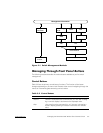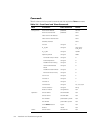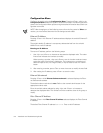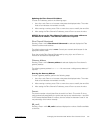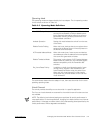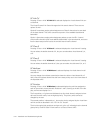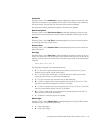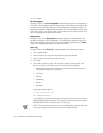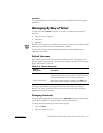
3-10 Installation and Troubleshooting Guide
The number displayed represents the number of buffers, from 1 to 16, available to the
host. For a complete description of buffer-to-buffer credit, refer to the industry specifi-
cation “Fibre Channel Physical and Signaling Interface (FC-PH).”
%$$&'
Pressing <Enter> while R_A_TOV is selected displays the Resource Allocation Time
Out Value (R_A_TOV).
The R_A_TOV is adjustable in 1-second increments using front panel controls, but its
value is displayed in milliseconds. This variable works with the variable E_D_TOV to
determine the switch’s actions when presented with an error condition. Allocated cir-
cuit resources with detected errors are not released until the time value has expired.
If the condition is resolved prior to timing out, the internal time out clock resets and
waits for the next error condition.
The range is 1 to 120 seconds.
NOTE: The set value must be larger than the set value for the Error Detect Time Out
Value.
$#$&'
Pressing <Enter> while E_D_TOV is selected displays the Error Detect Time Out
Value (E_D_TOV).
The E_D_TOV is adjustable in 1-second increments using the front panel controls, but
its value is displayed in milliseconds.
NOTE: Use the
flashSet
command during a
Te l n e t
session to set the E_D_TOV or
R_A_TOV (in milliseconds) for values other than whole seconds.
This timer is used to flag a potential error condition when an expected response is not
received (an acknowledgment or reply in response to packet receipt, for example)
within the set time limit. If the time for an expected response exceeds the set value,
then an error condition is met.
The range is 1 to 60 seconds.
NOTE: The set value must be less than the set value for the Resource Allocation Time
Out Value.




